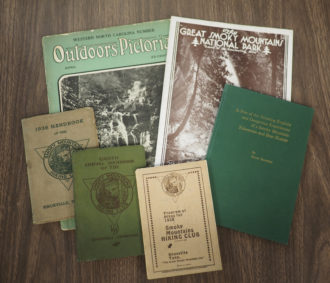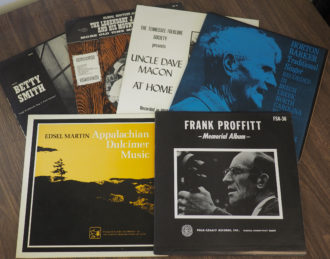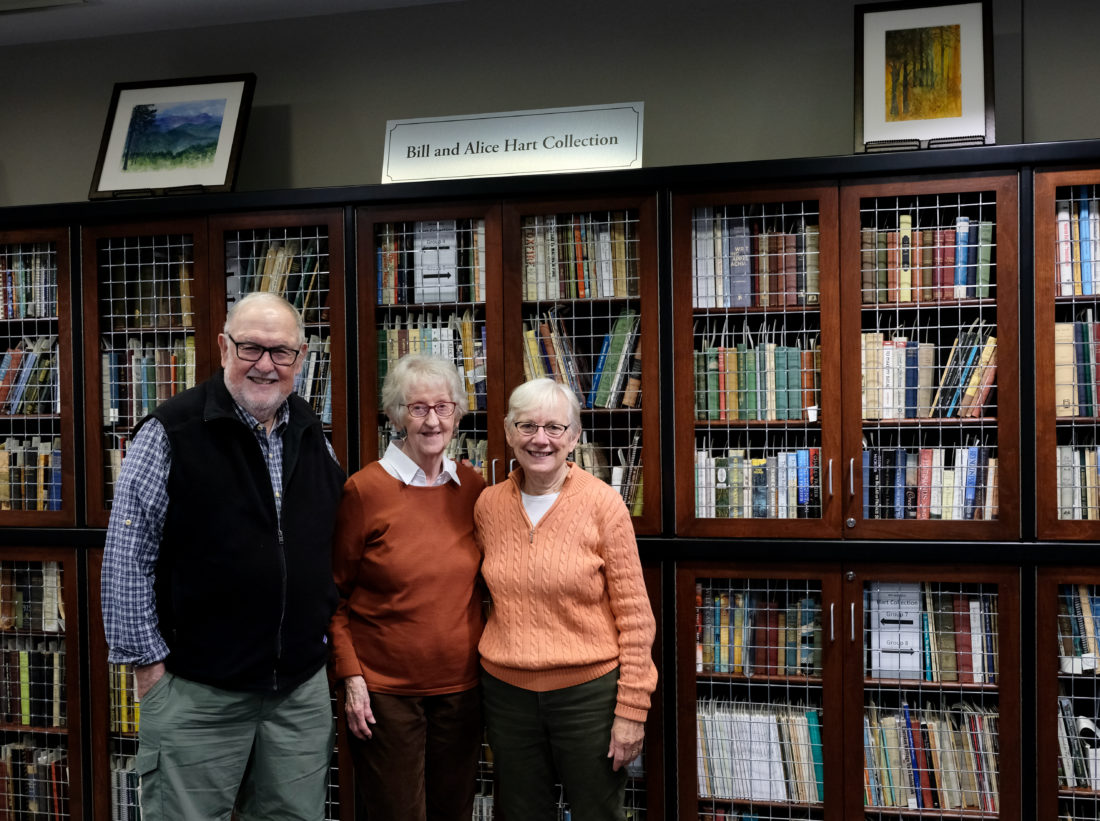The Bill and Alice Hart Collection has created quite the stir at UNC Asheville.
Donated to the university’s Special Collections last fall, the large private library has since prompted Gene Hyde, head of special collections and university archivist, to call it “the crown jewel” of his department’s holdings. Meanwhile, UNCA history professor Dan Pierce “can’t say enough” about how important it is for scholars and the general public alike.
“It’s the comprehensive nature of the collection,” Pierce says. “There’s just no place that has a collection that really encompasses just about everything that was ever produced on the [Smoky Mountains]. And it’s not just the Smokies but Western North Carolina in general.”
Deep roots
A native of Sylva, Alice Hart can trace her heritage to some of the first European settlers in what would later become Jackson County, and she also has a long lineage in Madison County. Bill Hart grew up in Weaverville and is a sixth-generation descendant of James Reeves, who settled in Sandy Mush circa 1798 and was one of the first 800 settlers in Buncombe County.
Since the beginning of their relationship, the pair have enjoyed visiting Great Smoky Mountains National Park, where they first developed a keen interest in regional flora and fauna. This, in tandem with their other ties to the area, inspired them to make a pact soon after they wed in 1960.
“We realized that we’d probably spend our lives here,” Bill says. “And because of our backgrounds and our heritage, we decided we’d devote ourselves to learning whatever we could about Western North Carolina.”
Further fueling that interest is the Harts’ backgrounds as educators. Alice served as a teacher, principal and in multiple administrative roles with Buncombe County and Asheville City Schools; Bill taught high school history before turning to a career in human resource management, consulting and training. But neither expected that this commitment to lifelong learning would result in an unprecedented private collection.
Book by book
In 1965, Bill checked out three books from his local library: Land of High Horizons: An Intimate Interpretation of the Great Smokies by Elizabeth Skaggs Bowman (published in 1938); The Great Smoky Mountains by Laura Thornborough (1937); and The Great Smokies and the Blue Ridge, edited by Roderick Peattie (1943). The information gleaned from these texts made such an impact on him that he decided to purchase his own copies.
Since that time, Bill and Alice have developed meaningful relationships with former local booksellers, including Nancy Brown of Bookmart in Biltmore Village and Miegan and Chandler Gordon, owners of The Captain’s Bookshelf.
“My relationship with [the late] Chan Gordon was such that he and I would conspire to find really valuable books for Bill,” Alice says. “Sometimes Chan would call me if he knew [Bill’s] birthday was rolling around or Christmas [was near], and he would present an opportunity.”
Over the decades, the Harts’ collection continued to grow, and in 1995 they built a new home in Fletcher’s Cane Creek Valley with a dedicated library featuring 103 linear feet of shelf space. The collection soon became what Alice describes as “a magnet” for scholars, and the Harts opened their home to Janet McCue (Back of Beyond: A Horace Kephart Biography), Rose Houk (Pictures for a Park: How Photographers Saved the Great Smoky Mountains), Pierce (Great Smokies: From Natural Habitat to National Park) and others to conduct research for their books.

Among the 1,200-plus monographs and 26 linear feet of ephemera and other materials that UNCA now has, Pierce is particularly impressed by the numerous first editions of “very important books,” unusual items such as railroad brochures from the 1920s and various promotional literature about the national park from that era. In addition, there are more than 100 vinyl records of old-time, bluegrass and regional music.
“[Bill and Alice are] both from pretty rural areas, and they’re kind of shaped by the stereotyping of Appalachian people and definitely want to send a message that there are plenty of smart, capable, intelligent, creative, entrepreneurial people in Western North Carolina,” Pierce says. “That’s part of their mission in terms of preserving all this.”
Moving days
In considering the future of their library, the Harts reflected on their friendships with Pierce, Hyde and Special Collections assistant Ashley Whittle and, in summer 2021, sided with preservation over profit.
“We knew that we had a very valuable collection,” Alice says. “Individual books — if we sold them — would’ve brought a lot of money. But the value of it was the collection, and we realized that we wanted it to stay as a collection, and we wanted it to serve in some way at UNCA.”
Prior to the move, the couple’s collection had been arranged categorically on their shelves into a dozen groups, including “Great Smoky Mountains National Park,” “Cherokee and Indigenous History and Archeology” and “Asheville and the Civil War.” Over the course of a month, Hyde and Whittle transferred the collection from the Hart home to UNCA, where the archivists were careful to keep the organization intact.
They also made sure to bring along another perk of the collection.
“Often, Bill would discuss a book or piece of ephemera, his deep knowledge making these conversations a series of master classes about the provenance, history and context of an item,” Hyde says. “In order to capture Bill’s narrative gift in describing books in the collection, we made a series of videos in which he selects important works from each group in the collection, annotating and providing context to major works and authors.”

The gift that keeps on giving
As the Harts hoped, the collection thoroughly enriched their connections to their ancestral home, as well as the people who contributed to the region’s history. And while a fair amount of people outside their family have also had transformative experiences by consulting the couple’s library, that number is about to grow exponentially with their recent donation.
“We were so fortunate because basically any academic library in the country would’ve wanted this collection,” Pierce says. “Anybody who does research on this region is going to use that collection. There’s just nothing else like it out there.”
Pierce himself is among those who’ve already been taking advantage of the campus addition. The professor is working on a book about the history of Western North Carolina and notes it’s been wonderful to not have far to go to access whatever research materials he needs. He adds that UNCA history majors are required to write a capstone paper and that having the collection on campus will be a boon to students for decades to come.
“There’s an endless number of thesis topics that can be researched using that collection,” Pierce says. “We don’t limit what they do. We’ve had students travel all over the place and do research on Japanese internment camps and you name it. But most end up choosing something Western North Carolina-related, so it’s a great opportunity for them.”
Though the collection has a new home, the Harts have retained what Bill calls “an essential library” of roughly 1,000 books on WNC history — all of which are duplicate copies so as not to withhold anything from UNCA.
Maintaining a home collection comes as a particular relief to the Hart’s 18-year-old grandson, Will Hart, who has spent time in the family library since he was an infant. Of all their relatives, Alice says, her grandson “probably gulped more than anybody else about the library leaving.” But once Will spoke with Hyde and Whittle about their plans for the collection, he became convinced that it was in the proper hands.
“I think it’s good that people, not only just in Western North Carolina but anyone from anywhere in the country that wants to learn about this area or just some of the regional history, they have access,” Will says. “I think that’s important.”
To learn more, visit avl.mx/cbf.




Before you comment
The comments section is here to provide a platform for civil dialogue on the issues we face together as a local community. Xpress is committed to offering this platform for all voices, but when the tone of the discussion gets nasty or strays off topic, we believe many people choose not to participate. Xpress editors are determined to moderate comments to ensure a constructive interchange is maintained. All comments judged not to be in keeping with the spirit of civil discourse will be removed and repeat violators will be banned. See here for our terms of service. Thank you for being part of this effort to promote respectful discussion.